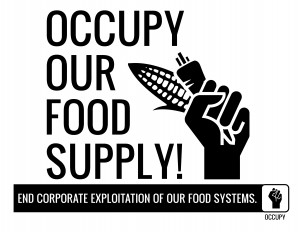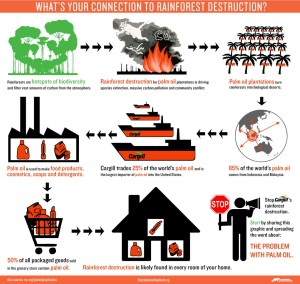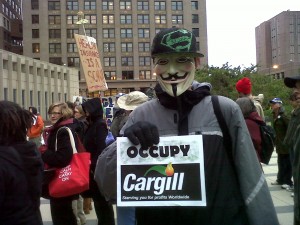 Big Food and Big Banks are two peas in a proverbial pod. Cloaked in corporate personhood, they form a 1%-reciprocal relationship to profiteer from deregulation while endangering our health, poisoning our land, and blocking sustainable long-term solutions in the name of short-term profit. Thank goodness everyday people are reclaiming our food supply from the insanely unsustainable hands of the corporate few. We are putting our own hands into the soil and raising our fists to resist the corporate food regime.
Big Food and Big Banks are two peas in a proverbial pod. Cloaked in corporate personhood, they form a 1%-reciprocal relationship to profiteer from deregulation while endangering our health, poisoning our land, and blocking sustainable long-term solutions in the name of short-term profit. Thank goodness everyday people are reclaiming our food supply from the insanely unsustainable hands of the corporate few. We are putting our own hands into the soil and raising our fists to resist the corporate food regime.
There is much fertile ground in the ‘convergence in diversity’ between the Occupy/Decolonize movement and the Food movement. The systems-level analysis provoked by the Occupy Wall Street movement is getting down to the roots of today’s rampant problems and injustices, and the food movement has some sensible solutions that grow from the roots up. Millions of people recognize that Big Ag is bad for human health and the health of the planet. It is a dinosaur economy. Local agriculture creates healthy communities and provides meaningful, fair work without the toxins and exploitation enforced by Big Ag’s bottom line.
For example, agirculture giant Cargill’s manipulation of food prices and markets has done a lot to create a food system that the company would love to call “too big to fail.” The problem is that it IS failing, badly, and lives are on the line. Recently, Cargill CEO Greg Page pulled a PR stunt attempting to launch a “too big to fail” analysis of Cargill’s role in fighting world hunger. But multiple UN and multi-institutional academic studies show that organic agriculture and agroecology have a better chance of creating food security and solving the problems of hunger than corporations that are exploiting ecosystems for monoculture crops, jumping from crisis to crisis, and speculating and profiteering all along the way. Barry Estabrook lists dozens of similarly concluded studies in The Atlantic, including a U.N.-supported study with over 400 expert contributors that calls on governments to support sustainable and small-scale agricultural practices to increase food security. Shouldn’t that put the onus on the corporate food regime to show they actually can do it better? Big Ag’s dismissal of organic farming’s potential stands comparatively unsubstantiated. But maybe that’s exactly how companies like Cargill want it, because the reality is that Big Ag is a bad way to organize our food system. 
For example, let’s look at the global mess Cargill has contributed to with palm oil. Increasing demand for a cheap vegetable oil with a decent shelf life has put palm oil and its derivatives on over half of the ingredients labels of packaged foods in grocery stores. But where does palm oil come from? The majority of the time it comes from deforestation of precious rainforest in Indonesia and Malaysia. The rate of deforestation in Indonesia is at 3.6 million acres per year, which equals just over 5 football fields of deforestation per minute. Forests are replaced with monoculture oil palm plantations as far as the eye can see. This is causing many social and environmental problems such as land grabs displacing Indigenous and forest-dependent communities, as well as poor working conditions that include slave-labor conditions on monoculture palm oil plantations. It is also contributing to the looming extinction of species like the Orangutan and decimating high-carbon value peatlands, which has helped catapult Indonesia to the #3 spot on the list of the world’s highest greenhouse gas emitters. The plantation workers and their families often live on palm plantations with little food security as plantations displace community gardens. Already there are cases of bankrupt plantations leaving workers and their families struggling with hunger. This is corporate colonialism, eliminating Indonesia’s vital national heritage for the benefit of the First World 1%.
It’s time to Occupy Cargill. A palm oil policy with commitments around human rights, greenhouse gas emissions, and rainforest protection would be the very minimum to justify Cargill even being allowed to call their business model ethical. But at the end of the day, we know it is a bigger system-change that is needed, a change that goes beyond corporate sustainability lip service. We need to create alternatives that are allowed to out-compete Big Ag’s business as usual. It’s time to Occupy Our Food Supply and reclaim food sovereignty from the corporate food regime.
A palm oil policy with commitments around human rights, greenhouse gas emissions, and rainforest protection would be the very minimum to justify Cargill even being allowed to call their business model ethical. But at the end of the day, we know it is a bigger system-change that is needed, a change that goes beyond corporate sustainability lip service. We need to create alternatives that are allowed to out-compete Big Ag’s business as usual. It’s time to Occupy Our Food Supply and reclaim food sovereignty from the corporate food regime.